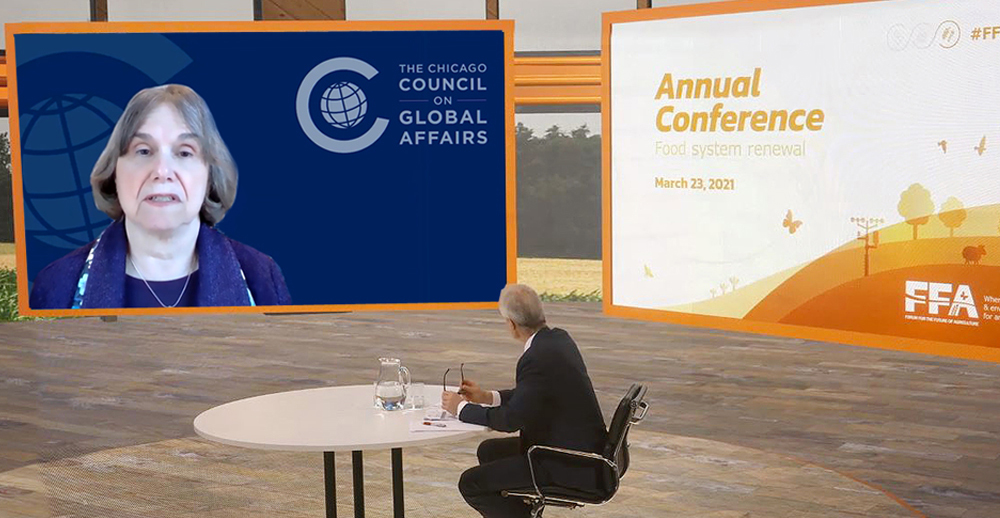Making the food system climate resilient
FFA2021 Annual Conference session 2 summary
Monday, Apr 12, 2021
The second session of the FFA2021 Annual Conference featured speeches from Catherine Bertini, World Food Prize Laureate & Distinguished Fellow, Chicago Council on Global Affairs; and the young and inspirational climate justice activist, Vanessa Nakate, alongside an energetic moderated panel discussion.
In her keynote address, Catherine Bertini warned that new techniques or technology were not sufficient to create sustainable food systems. “Leadership, and effective leadership, is critical.”
We must move beyond an agricultural system “designed for maximum output of a few high profit crops” to one that addresses the sustainability, availability, equity, nutrition, and health benefits of the food grown and consumed. By empowering, and listening to people, particularly women, a global effort can bring system change and turn current problems “into achievable opportunities within our lifetime”.
In the panel discussion, Benedikt Bösel, CEO & Founder, Gut&Bösel, emphasised that only farmers can make the changes to create sustainable food systems. “The question is not what farmers can do for us in terms of health, biodiversity and climate change, but what can we do for farmers?” He was critical of large corporations shaping agriculture to maximise profits, calling for “a step back to look at our values”. He identified the need for true cost accounting to monetise the impact of production on ecosystems, health, and rural communities, and research and education to help farmers work with nature.
Marion Jansen, Director of the Trade and Agriculture Directorate, OECD, set out three challenges: guaranteeing income to farmers; making agriculture environmentally sustainable; and, providing sufficient quality nutrition to a growing population. This requires a complex policy mix with the right incentives for producers, distributors, and consumers. The billions of dollars of subsidies given to agriculture are “a lose/lose situation”. They distort competition and do not raise farmers’ incomes or support the environment. The Director stressed that making food systems climate resilient is not a North/South issue. “This is a global and intergenerational problem. We have to tackle it now”.
Carina Millstone, Executive Director, Feedback Global, argued that a few multinational corporations, with profit as their guiding principle, are the root cause of unsustainable food systems. “That precludes food systems being geared towards other goals: better nutrition, ecological renewal, and a stable climate”. She called for transition “to a post-capitalist, post-corporate economic system”, with an end to industrial meat production, describing this “as incompatible with a sustainable world as coal extraction”. She questioned the emphasis on innovation, pointing out major climate gains could be made by reducing meat consumption and halving food waste.
Erik Fyrwald, Chief Executive Officer, Syngenta Group, stressed that it requires massive innovation to solve the major challenges facing the world. He believes private enterprise, together with NGOs and governments, all need to work together to help farmers be the solution to climate change. He highlighted how Syngenta believes in regenerative agriculture and the development of farming practices to help solve climate change whilst feeding the world. He suggested the company, farmers, and critics of big corporations had much in common. All want sustainable farming, lower greenhouse emissions, carbon neutral agriculture, protection for forests and biodiversity, and reduced use of pesticides.
In a powerful special address, Vanessa Nakate, a young climate justice activist in Uganda, spoke of the realities of climate change in Africa, where extreme weather patterns are wrecking people’s livelihoods. She insisted “the climate crisis is a food crisis and the food crisis is a humanitarian crisis. There is no climate justice without ensuring there is food justice”. Calling for an end to investment in fossil fuels, she told participants: “We cannot eat coal and we cannot drink oil.”
Prefer to watch the live presentation?
Click here to watch this and other sessions from FFA2021.



